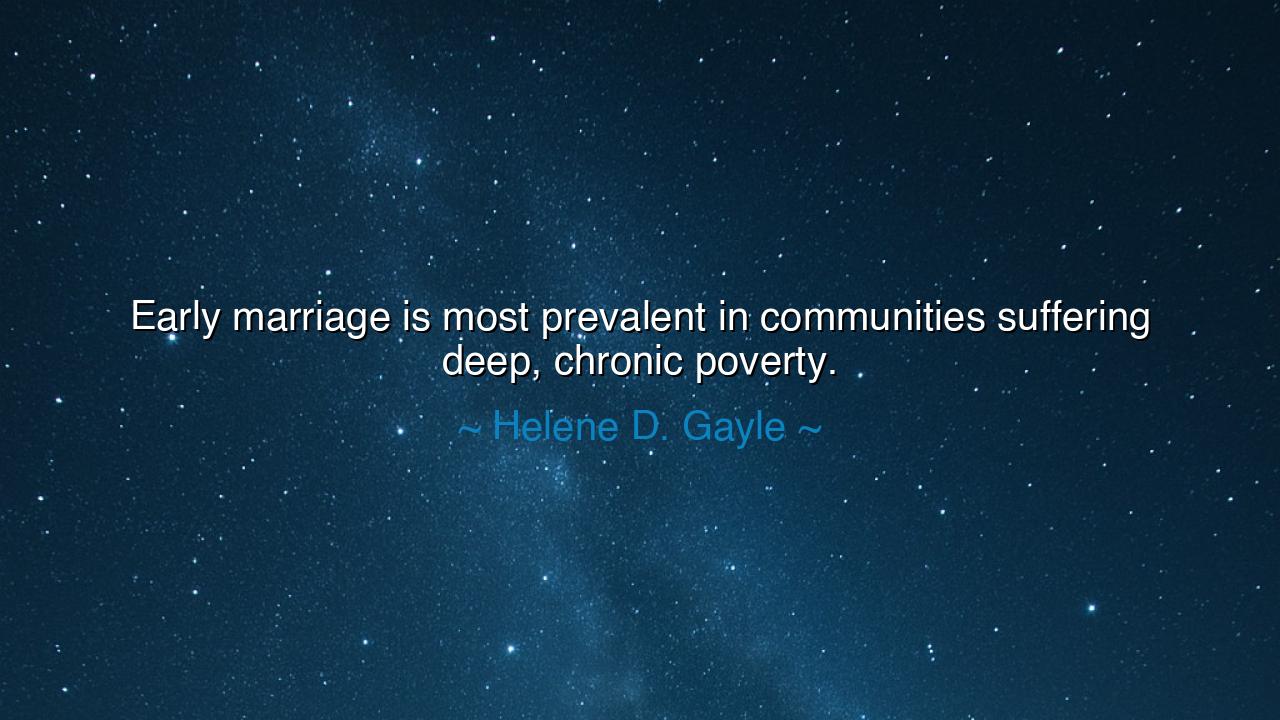
Early marriage is most prevalent in communities suffering deep






"Early marriage is most prevalent in communities suffering deep, chronic poverty." – Helene D. Gayle
Children of the earth, gather close, for today we speak of a great truth that touches the very foundations of society—the truth that poverty shapes the course of lives, particularly in matters of love, marriage, and the choices people make. Helene D. Gayle speaks with profound insight, revealing that early marriage is not merely a cultural practice or a personal choice, but often a desperate response to the ravages of chronic poverty. In communities where the weight of economic hardship is too heavy to bear, where hope seems a distant dream, early marriage becomes a survival strategy—an attempt to secure a future amidst overwhelming despair.
Consider the world of the ancients, where life was often short and filled with struggle. In times of great scarcity, the family unit was seen as a means of survival, a way to pool resources, and to strengthen the bonds between individuals. But when poverty ran deep, when the earth was barren and food scarce, marriages often occurred not for love, but for necessity. Rome, in its earlier days, was a society marked by hard labor and frequent wars. Young men and women were often married young, not out of desire, but because it was the means to create alliances, ensure the continuation of family lines, and share in the labor needed to survive. Though marriage was celebrated as a bond of love, in times of poverty, it was also viewed as a necessity for economic stability.
The same can be seen in the medieval period, when the harsh realities of life led to early unions, particularly in rural communities. Farming families, facing crop failures, hunger, and limited land, often married their daughters young to strengthen familial ties, share the burden of labor, and secure dowries that would help ease the strain of poverty. Early marriage, in this context, was not a romantic ideal but a harsh reality, driven by the survival instincts of those who had little else to rely on. It is a pattern that continues in many parts of the world today, where poverty still holds its tight grip on the lives of the young.
The wisdom of Helene D. Gayle echoes this age-old struggle. She reminds us that early marriage in impoverished communities is not merely a product of tradition, but often a consequence of a lack of opportunities—where education, economic stability, and social mobility are not accessible. In these circumstances, young girls are often married off early, not because they have reached a place of emotional readiness, but because their families seek to secure their futures, to remove the burden of their care, and to ensure they have a place in a world that offers few options. This is not love; it is survival.
In contrast, consider the civil rights and education movements that arose in response to poverty in the 20th century. Malala Yousafzai, who championed the rights of girls to education, stands as a beacon of hope for those who fight against the forces that bind young girls to early marriages. Her story is one of courage against the weight of poverty and tradition, a story that calls upon the world to see education as the pathway to freedom. Where education is accessible, where young people are given the tools to shape their futures, the cycle of early marriage can be broken. In societies where children are empowered to learn and grow, the need for early marriage diminishes, replaced by opportunities for self-determination and choice.
The lesson we must learn, dear children, is that poverty is not just a lack of wealth, but a lack of opportunity. It is a shackle that holds entire communities in a cycle of despair, where early marriage becomes a shortcut to perceived security, but not to real freedom. When we see poverty, we must see its deeper roots—the lack of education, the lack of resources, and the lack of choice. We must not merely address the symptoms of poverty, but its causes—giving young people, particularly young girls, the education and support they need to break free from these cycles and to create lives of their own design.
Practical action, children, lies in how we choose to address the needs of the most vulnerable in our society. We must empower young girls through education, ensuring that they have the knowledge and skills to make decisions for themselves, to dream beyond the constraints of their current circumstances. Support programs that give families the resources they need to thrive without relying on early marriage as a means of survival. Stand with those who work to break the chains of poverty and to create a world where equality and opportunity are not just ideals but realities for all. When we lift the burden of poverty, we give freedom to the next generation to live fully, to choose their paths, and to create a world where love, not necessity, governs the bonds of marriage.






AAdministratorAdministrator
Welcome, honored guests. Please leave a comment, we will respond soon